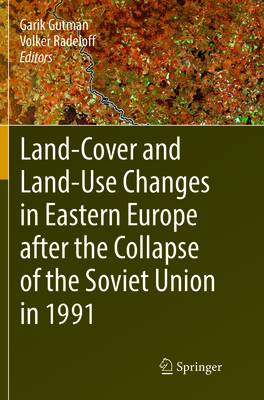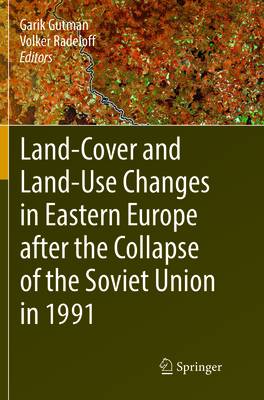
- Retrait gratuit dans votre magasin Club
- 7.000.000 titres dans notre catalogue
- Payer en toute sécurité
- Toujours un magasin près de chez vous
- Retrait gratuit dans votre magasin Club
- 7.000.0000 titres dans notre catalogue
- Payer en toute sécurité
- Toujours un magasin près de chez vous
Land-Cover and Land-Use Changes in Eastern Europe After the Collapse of the Soviet Union in 1991
167,95 €
+ 335 points
Description
This work analyzes the effects of one of the most dramatic changes of entire societies that the world has ever witnessed. It explores the collapse of socialist governance and management systems on land cover and land use in various parts of Eastern Europe. As readers will discover, this involved rapid and unprecedented changes such as widespread agricultural abandonment. Changes in the countries of the former Soviet block, former Soviet Union republics, and European Russia are compared and contrasted.
Contributing authors cover topics such as the carbon cycle and the environment, effects of institutional changes on urban centers and agriculture, as well as changes in wildlife populations. The volume includes analysis of the drivers of agricultural land abandonment, forest changes in Black Sea region, an extreme drought event of 2010, impacts of fires on air quality and other land-cover/land-use issues in Eastern Europe. Satellite data used were mostly from optical sensors including night lights observations, with both coarse and medium spatial resolution.
Ultimately, this work highlights the importance of understanding socioeconomic shocks: that is, those brief periods during which societies change rapidly resulting in significant impact on land use and the environment. Thus it shows that change is often abrupt rather than gradual and thereby much harder to predict.
This book is a truly international and interdisciplinary effort, written by a team of scientists from the USA, Europe, and Russia. It will be of interest to a broad range of scientists at all levels within natural and social sciences, including those studying recent and ongoing changes in Europe. In particular, it will appeal to geographers, environmental scientists, remote sensing specialists, social scientists and agricultural scientists.
Contributing authors cover topics such as the carbon cycle and the environment, effects of institutional changes on urban centers and agriculture, as well as changes in wildlife populations. The volume includes analysis of the drivers of agricultural land abandonment, forest changes in Black Sea region, an extreme drought event of 2010, impacts of fires on air quality and other land-cover/land-use issues in Eastern Europe. Satellite data used were mostly from optical sensors including night lights observations, with both coarse and medium spatial resolution.
Ultimately, this work highlights the importance of understanding socioeconomic shocks: that is, those brief periods during which societies change rapidly resulting in significant impact on land use and the environment. Thus it shows that change is often abrupt rather than gradual and thereby much harder to predict.
This book is a truly international and interdisciplinary effort, written by a team of scientists from the USA, Europe, and Russia. It will be of interest to a broad range of scientists at all levels within natural and social sciences, including those studying recent and ongoing changes in Europe. In particular, it will appeal to geographers, environmental scientists, remote sensing specialists, social scientists and agricultural scientists.
Spécifications
Parties prenantes
- Editeur:
Contenu
- Nombre de pages :
- 247
- Langue:
- Anglais
- Collection :
Caractéristiques
- EAN:
- 9783319826240
- Date de parution :
- 28-06-18
- Format:
- Livre broché
- Format numérique:
- Trade paperback (VS)
- Dimensions :
- 155 mm x 235 mm
- Poids :
- 542 g

Les avis
Nous publions uniquement les avis qui respectent les conditions requises. Consultez nos conditions pour les avis.





